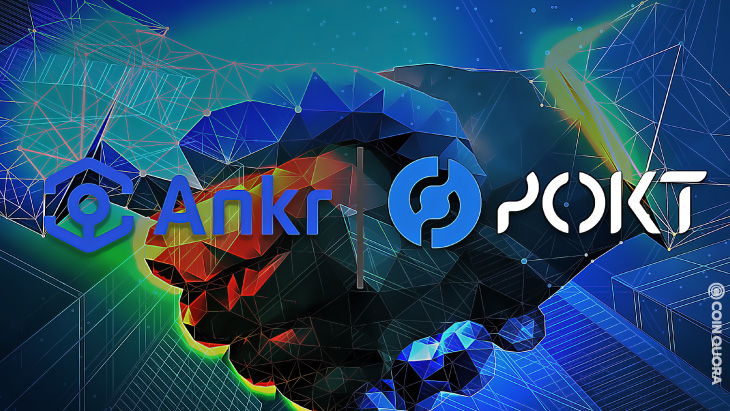- Ankr ties up with Pocket Network to achieve a fully decentralized infrastructure for Web3.
- Pocket Network is by far the largest dApps provider added to the list of Ankr’s whitelist providers.
- Following this partnership, Pocket witnessed a 30% hike in its nodes’ usage.
To accelerate towards a fully decentralized infrastructure for an enhanced Web3 ecosystem, Web3 infrastructure provider Ankr partners with Pocket Network, a blockchain development decentralized applications (dApps).
Since both the platforms strive to create decentralized node infrastructure, this partnership enables Pocket Network to become a node provider on the Ankr Protocol. This allows Pocket Network’s node runners to earn revenue by supplying nodes to the Ankr Protocol network.
In detail, this initiative will help the builders, wallets, and dApps that interact in blockchains via their RPC services to reach a fully decentralized pool of nodes.
Pocket Network is the recent addition to the list of whitelist providers that are authorized to supply nodes to Ankr.
Bringing Pocket onto the Ankr Protocol marks a new era of coverage and decentralization for Ankr and our clients. We love what Pocket has started and the passionate community they’ve fostered.
Speaking on the occasion, the Chief Marketing Officer at Ankr, Greg Gopman, further acclaimed, “We’re thrilled to have them join on our journey to create the best Web3 Infrastructure solutions”
Since Pocket Network boasts a globally distributed network of 44,000 nodes, it has become one of the go-to node providers serving blockchain requests through both of its nodes, Harmony and IoTeX chains.
Moreover, Pocket Network’s native token POKT is directly impacted by the traffic the network serves, the more the merrier. This also decides the incentives that developers, token holders, and node providers receive.
Reportedly, following the partnership, Pocket Network has seen a 30% hike in both Harmony and IoTeX nodes’ usage. This partnership also enables Ankr Protocol to give users the lowest latency connections and thereby its distribution will rise. This will result in developers and dApps connecting to the prominent blockchains in the most efficient and decentralized way possible.
Currently, Ankr serves an average of 6 billion blockchain requests per day across over 50 chains. As it continues to decentralize its infrastructure and diversify node providers, this collaboration allows Ankr to serve Web3 as a better collaborative protocol versus a centralized entity.


